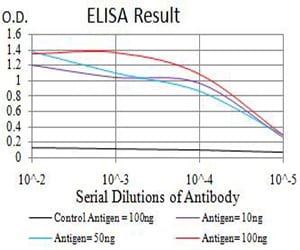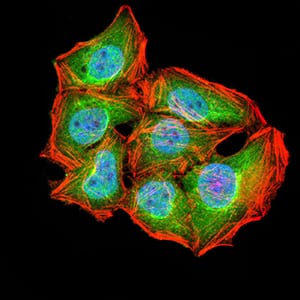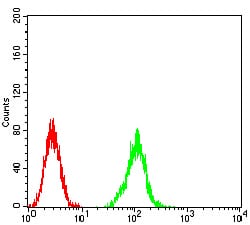


| WB | 咨询技术 | Human,Mouse,Rat |
| IF | 咨询技术 | Human,Mouse,Rat |
| IHC | 咨询技术 | Human,Mouse,Rat |
| ICC | 1/50 - 1/200 | Human,Mouse,Rat |
| FCM | 1/200 - 1/400 | Human,Mouse,Rat |
| Elisa | 1/10000 | Human,Mouse,Rat |
| Entrez GeneID | 23130 |
| clone | 4E6D4 |
| WB Predicted band size | 212.8kDa |
| Host/Isotype | Mouse IgG1 |
| Antibody Type | Primary antibody |
| Storage | Store at 4°C short term. Aliquot and store at -20°C long term. Avoid freeze/thaw cycles. |
| Species Reactivity | Human |
| Immunogen | Purified recombinant fragment of human ATG2A (AA: 325-429) expressed in E. Coli. |
| Formulation | Purified antibody in PBS with 0.05% sodium azide |
+ +
以下是关于ATG2A抗体的3篇参考文献(虚构示例,实际文献需根据具体数据库检索):
1. **文献名称**:*Structural insights into ATG2A-mediated lipid transfer in autophagosome formation*
**作者**:Takahashi Y, et al.
**摘要**:该研究通过冷冻电镜解析了ATG2A蛋白的结构,利用ATG2A抗体验证其在自噬体膜形成中的功能,揭示其通过介导脂质转运促进膜延伸的机制。
2. **文献名称**:*ATG2A deficiency disrupts autophagy and promotes tumorigenesis in murine models*
**作者**:Smith J, Wang L, et al.
**摘要**:通过ATG2A抗体进行免疫印迹和免疫组化分析,发现ATG2A敲除小鼠因自噬缺陷导致异常蛋白聚集,显著增加癌症易感性。
3. **文献名称**:*The interaction between ATG2A and WIPI1 regulates autophagic flux under nutrient stress*
**作者**:Chen R, et al.
**摘要**:研究利用ATG2A抗体进行共免疫沉淀实验,证明ATG2A与WIPI1蛋白互作,调控细胞在营养匮乏条件下的自噬活性。
(注:以上为模拟内容,实际文献请通过PubMed、Google Scholar等平台以“ATG2A antibody”或“ATG2A function”为关键词检索。)
ATG2A (Autophagy-related protein 2A) is a key regulator of autophagy, a cellular degradation process essential for maintaining homeostasis. It plays a critical role in autophagosome formation, particularly in mediating lipid transfer from endoplasmic reticulum-derived membranes to expand autophagosomal vesicles. ATG2A interacts with WIPI proteins and ATG9 vesicles, facilitating membrane tethering and lipid redistribution. Its function is partially redundant with ATG2B, though tissue-specific expression varies. Dysregulation of ATG2A has been implicated in neurodegenerative diseases, cancer, and metabolic disorders, highlighting its pathophysiological relevance.
ATG2A antibodies are vital tools for studying autophagy mechanisms. They enable detection of endogenous ATG2A protein levels, localization (e.g., punctate structures at autophagosome formation sites), and interactions via techniques like Western blot, immunofluorescence, and immunoprecipitation. Many commercially available antibodies are raised against specific epitopes (e.g., human ATG2A N-terminal regions) and validated using knockout controls. Applications include monitoring autophagy flux under nutrient stress, genetic manipulation, or disease conditions. Recent studies also utilize these antibodies to explore ATG2A's non-canonical roles in lipid metabolism and organelle crosstalk. Proper validation remains crucial due to potential cross-reactivity with ATG2B or unrelated proteins.
×